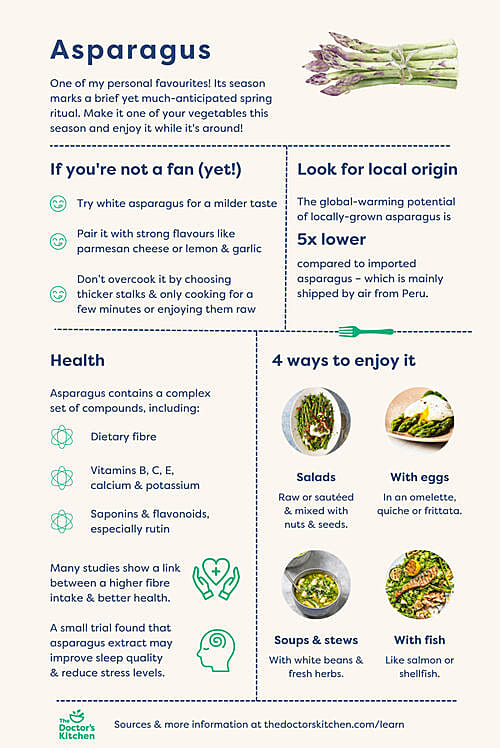Asparagus: Rich in prebiotic fibre
18th Apr 2023
Asparagus is a lovely reminder of spring. It cooks in minutes, is rich in fibre, folate and vitamin C, and tastes great with lemon, garlic or a bit of cheese.
Key points
Why is asparagus season so short?
In the UK, asparagus season is famously brief. It runs from late April until the summer solstice in June. The spears grow quickly and use a huge amount of energy. Farmers stop picking when the spears start to thin out, to help the plants store energy for next year. That short window makes British asparagus a real seasonal treat.
What makes white asparagus different?
White asparagus grows underground, away from the sun. That stops it turning green and gives it a milder, slightly sweeter flavour. It is loved in Germany, where it is nicknamed "white gold" and celebrated with Spargel festivals each year.
A plant with a story
Asparagus has been grown for more than 2,000 years. The Romans prized it so much that Emperor Augustus reportedly had an "Asparagus Fleet" to carry it across the empire. Its name comes from the Persian word "asparag", meaning sprout or shoot. In Asia, some wild species of asparagus have long been used in traditional medicine for digestion and respiratory health.
Health benefits of asparagus
As well as being quick to cook and full of flavour, asparagus brings a few useful things to the table. Here is what the research suggests.
1. Gut health
Asparagus contains prebiotic fibres such as inulin and xylose. These feed the helpful bacteria in your gut and may support a healthier microbiome.
2. Chronic disease protection
Eating more vegetables is linked to lower risks of heart disease and certain cancers. Asparagus offers both fibre and polyphenols, two key players in long-term health.
3. Stress and sleep
A small trial found an asparagus extract helped reduce levels of cortisol, the main stress hormone. It also seemed to improve sleep quality compared to a placebo. Early findings, but promising.
What nutrients does asparagus contain?
A portion is around 80 grams, or five spears. That gives you:
- Fibre for gut health and digestion
- Folate, with five to eight spears providing about 30 percent of your daily intake
- Potassium and vitamin C
- Phenolic acids such as caffeic acid
- Rutin, a flavonoid linked to anti-inflammatory and antioxidant activity

How it works: Together, these nutrients may support the immune system, help reduce inflammation and encourage a more diverse gut microbiome. Most studies so far are in labs or small trials, but the early evidence is encouraging. (Guo et al., 2020)
How to choose and cook asparagus
- Buy British when you can. It tastes better and has a lower environmental impact than imported asparagus.
- Skip the organic section: Asparagus doesn’t carry much of a pesticide load as it emerges from the ground and grows quickly. It’s often cited as one of the foods with the lowest amounts of pesticide residues in the US, according to the Environmental Working Group.
- Do not overcook it. Roasting or grilling for a few minutes is plenty.
Ways to enjoy
- Roasted with olive oil, garlic and lemon
- In salads with feta, chickpeas and a citrus dressing
- With eggs in an omelette or quiche
- In soup with peas, leeks and fresh herbs
- On toast with tomatoes and a little parmesan
In a nutshell
Save it on Pinterest or download it here.

References/sources
Human studies: Ito et al. 2014 - Aune et al. 2017 - Fu et al. 2022 - Veronese et al. 2018
History, compounds & biological activities: Redondo-Cuenca et al. 2023. - Iqbal et al. 2017
Environment: Frankowska et al. 2019 - The University of Arkansas System Division of Agriculture
